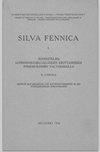我们能否在挪威木材供应的计量经济分析中发现地区差异?
IF 1.7
3区 农林科学
Q2 FORESTRY
引用次数: 0
摘要
在挪威和大多数北欧国家,林业和森林工业对区域收入和就业很重要,但是关于区域一级影响木材供应的因素的研究很少。本研究的主要目的是估计挪威六个地区的总区域木材供应弹性。因此,我们也测试了区域差异,重点放在木材价格,常存量和利率作为解释变量。我们使用了三种不同的统计模型(固定效应和随机效应面板模型以及一差模型),对挪威森林清查的区域数据进行了分析,其中包括1996 - 2016年期间的活立量和官方统计数据,包括采伐量、锯材和纸浆木材的利率和价格。在15对地区中,有12对地区的价格弹性存在显著差异。与其他地区相比,西部地区价格弹性较低,数量弹性较高。就规格测试而言,第一种不同的模型是最好的。使用特定区域的价格弹性比使用统一的价格参数稍微适合面板数据模型。结果表明,计量经济规范影响参数值,因此直接比较不同木材供应研究的结果是复杂的。木材供应的区域差异是重要的考虑因素。本文章由计算机程序翻译,如有差异,请以英文原文为准。
Can we detect regional differences in econometric analyses of the Norwegian timber supply?
Forestry and forest industries are important for regional income and employment in Norway as well as in most North European countries, but few studies exist about factors affecting the timber supply at regional level. The main objective of this study is to estimate aggregated regional timber supply elasticities for six regions in Norway. Thereby we also test for regional differences, focusing on wood prices, standing stock volume and interest rate as explanatory variables. We have used three different statistical models (fixed and random effects panel models and first difference models) on regional data from the Norwegian forest inventory on standing volume and official statistics on harvested volumes, interest rate and prices of sawlogs and pulpwood for the period 1996â2016. Statistically significant different price elasticities are found in 12 out of total 15 pairs of regions. The price elasticity was lower and the volume elasticity higher in the western region compared to the other regions. The first difference models are best with respect to specification tests. The use of region specific price elasticities gives slightly better fit for the panel data models than using a uniform price parameter. The results show that the econometric specification influence the parameter values, and it is thus complicated to directly compare results in different timber supply studies. Regional differences in timber supply are important to consider.
求助全文
通过发布文献求助,成功后即可免费获取论文全文。
去求助
来源期刊

Silva Fennica
农林科学-林学
CiteScore
3.50
自引率
11.10%
发文量
21
审稿时长
3 months
期刊介绍:
Silva Fennica publishes significant new knowledge on forest sciences. The scope covers research on forestry and forest ecosystems. Silva Fennica aims to increase understanding on forest ecosystems, and sustainable use and conservation of forest resources. Use of forest resources includes all aspects of forestry containing biomass-based and non-timber products, economic and social factors etc.
 求助内容:
求助内容: 应助结果提醒方式:
应助结果提醒方式:


